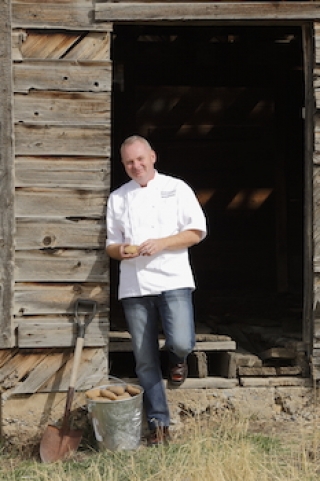
Food Trends from Cars to Cuisine
02 November 2015So, are you looking for the next hot trend in the culinary world? Maybe you should leaf through Vogue or search Motor Trends for insight. Popular lifestyle trends, including fashion, automotive and even construction, provide clues to the next hot menu item, according to Corporate Executive Chef David Macfarlane.
By Lisa Parrish, Gold Medal Classroom Editor
One of the Idahoan Foods Chef’s responsibilities has Macfarlane creating new food items by combing various potato products manufactured by his company. A recent example of his work was illustrated when he looked at restaurant menus across the country and took note of the tatter tots being offered.
“I wanted to utilize what we have: better flavor and texture (than frozen tatter tots),” Chef Macfarlane said. He collaborated with a chef from an Idahoan Foods supplier and created the Tater Tumbler, which features special seasonings and a mixture of mashed potatoes and hash browns. “It was a way for restaurants to utilize our products for a new, hot menu item,” the Chef said.
The current food trend, according to Chef Macfarlane, is quick food deliciously prepared. “The younger generation is impatient,” he said. “They would rather wait to order than wait for the food to be prepared.” He noted Chipotle Mexican Grill has taken advantage of the trend by making quick food delicious and as holistic as possible.
Chef Macfarlane used the business suit as another example of fashion and food trends merging. “When the business suit was popular the food trend that followed was the business lunch and dinner. With those corporate events, the cocktail took front and center over the more traditional glass of wine,” he explained.
In his position as a research and development chef, he translates new trends into realistic products for mass production. Chef Macfarlane often collaborates with food scientists in the process.
“Food scientists help build foods that have a longer shelf life and still retain the foods’ look and texture. The scientists use their knowledge of starches, gums and other materials to achieve this. They are precise in their knowledge of foods’ actions and reactions,” he said.
“At the end of the day, I am a chef. And a chef is an artist that has to use the creative side of his or her brain.”
One technique he applies in his creative endeavors is using a Gold Standard approach. Chef Macfarlane describes the process of creating a Gold Standard as determining the absolute best, freshest and the most holistic end-product possible. “That’s the gauge and everyone working on the project should aspire to achieve it,” he said. After the Gold Standard is achieved the challenge becomes to replicate the perfect dish in a manufacturing environment.
Chef Macfarlane’s talents and skills have been developed over a lifetime in the culinary field. He attended a high school where he focused on baking and pastry skills. He then spent 10 years in the United States Navy where he cooked not only for members of the USS Mount Whitney LCC-20 but also for former president Bill Clinton. After the Navy, he fulfilled a childhood dream of working in serval world-renown hotels. He has held many chef product development titles and has worked with experts throughout the field. Chef Macfarlane holds two degrees, an Associates of Baking & Pastry Arts and a bachelor of Culinary from Johnson and Wales University.
He is also author of “Ginger: A Boy’s Journey from Scotland to the White House” by Dunrobin Publishing.
Click here to read about Chef Macfarlane’s advice to culinary students looking ahead to a career in the culinary field.
